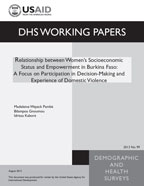
Abstract:
Background and Objective: Since 2009, the
Burkina Faso government has launched a
national policy to empower women and to
better integrate gender equity in policies,
actions, and programs. Research findings on
women’s empowerment to support this policy
are scarce, however. This paper therefore
explores how socioeconomic differences shape
two aspects of
women’s empowerment in the cultural and
social context of Burkina Faso, namely
decision-making in the household and
experience of domestic violence. Reducing
levels of domestic violence and improving
women’s participation are important to
empowering women.
Methods: Women’s participation in decision-
making was assessed through three measures:
involvement in decisions on woman’s own
health care, involvement in decisions on
major household purchases, and involvement in
decisions on visits to family or relatives.
Using binary logistic regression, we assessed
how women’s socioeconomic characteristics
shape each of the three outcome variables of
decision-making, and each of four outcome
variables of domestic violence—physical,
emotional, and sexual violence, and
psychological pressure. The study analyzed
data for 9,141 cohabiting or married women
who successfully completed the interview on
domestic violence from the 2010 Burkina Faso
Demographic and Health Survey
(DHS).
Results: Findings show low levels of
decision-making even among educated women and
women working for cash, but also very low
prevalence of domestic violence.
Participation in all the three aspects of
decision-making is positively associated with
working for cash. The more education women
have, the greater their involvement is in
decision-making for their own health care and
for family visiting. Household wealth status
has a much weaker association with
involvement in decision-making. Women’s
experience of physical, emotional, and sexual
violence by their husbands/partners generally
is weakly related to socioeconomic
characteristics. Only the richest women and
to a lesser extent women with formal
education are significantly more likely to
experience psychological pressure.
 Relationship between Women's Socioeconomic Status and Empowerment in Burkina Faso: A Focus on Participation in Decision-Making and Experience of Domestic Violence (PDF, 499K)
Relationship between Women's Socioeconomic Status and Empowerment in Burkina Faso: A Focus on Participation in Decision-Making and Experience of Domestic Violence (PDF, 499K)
